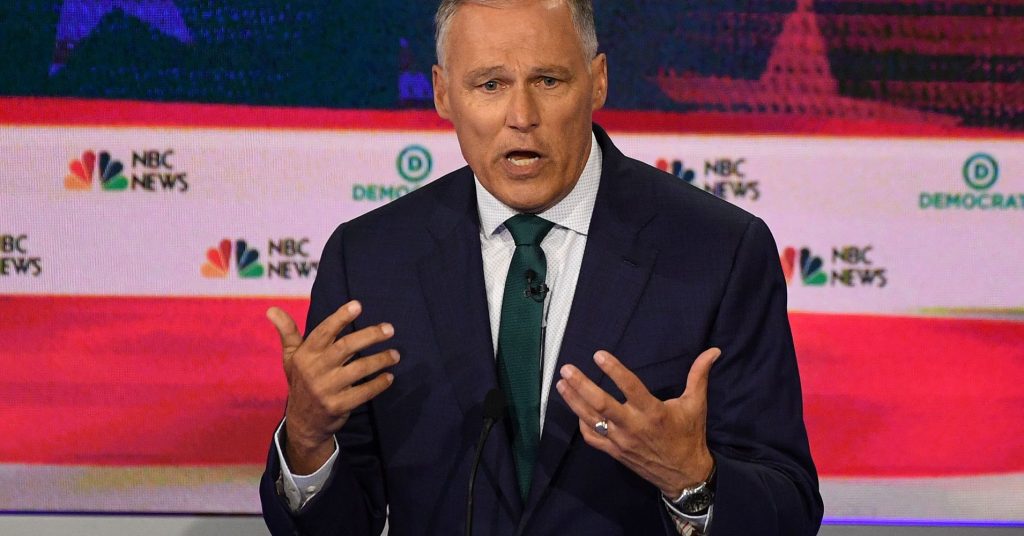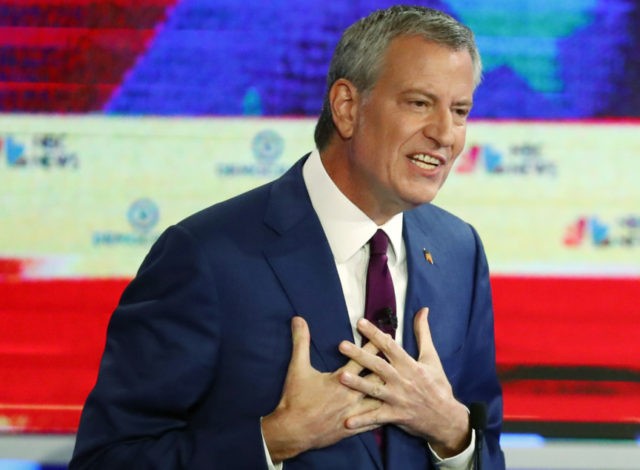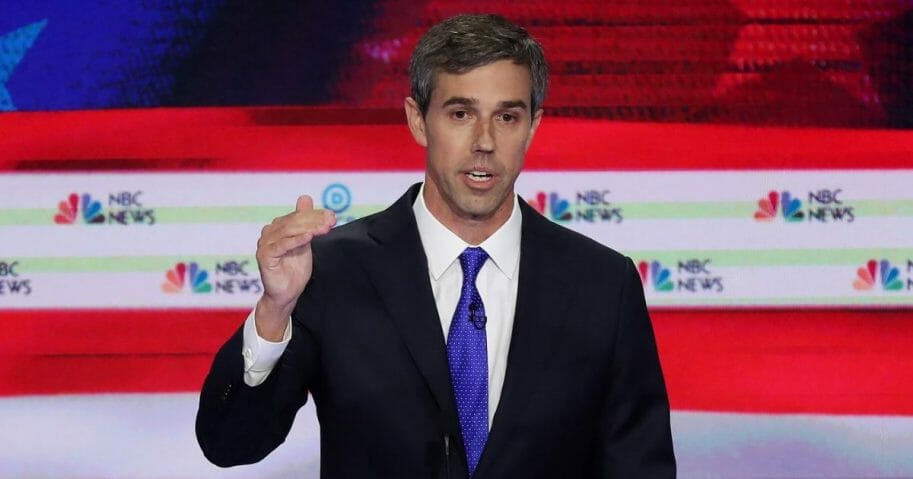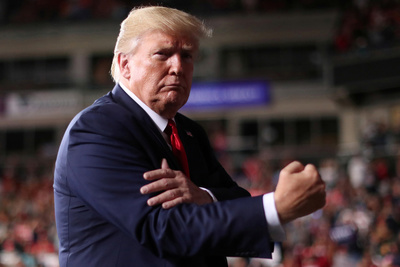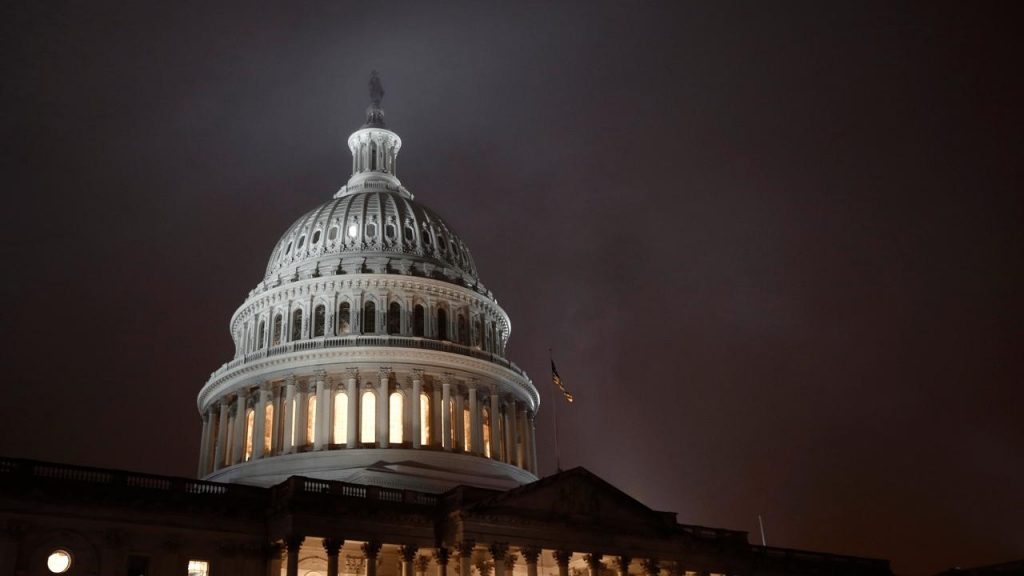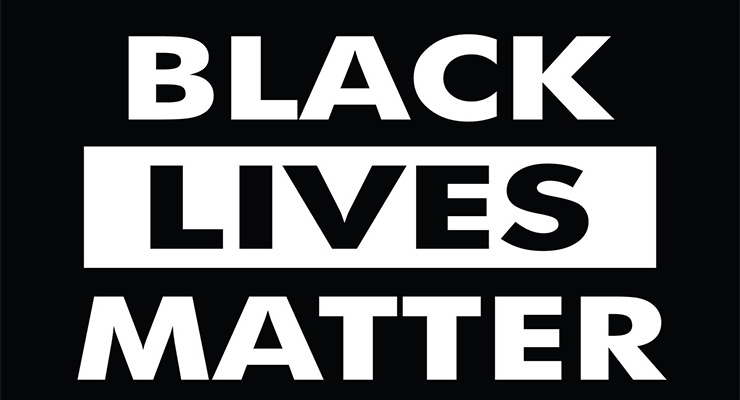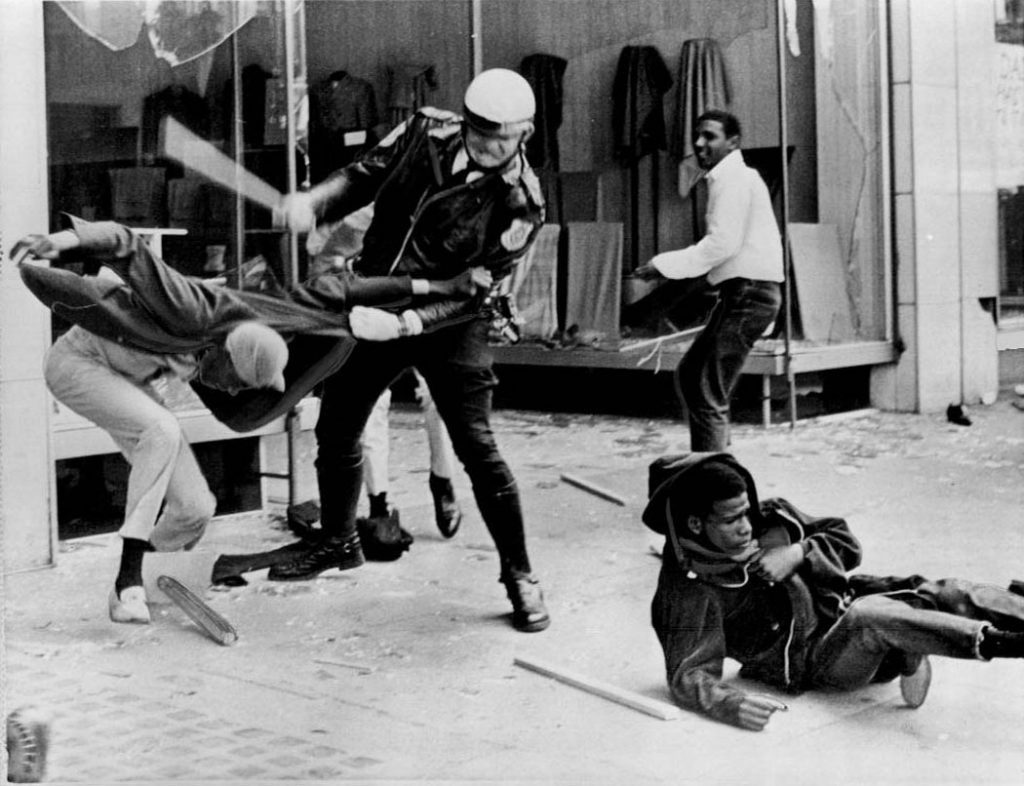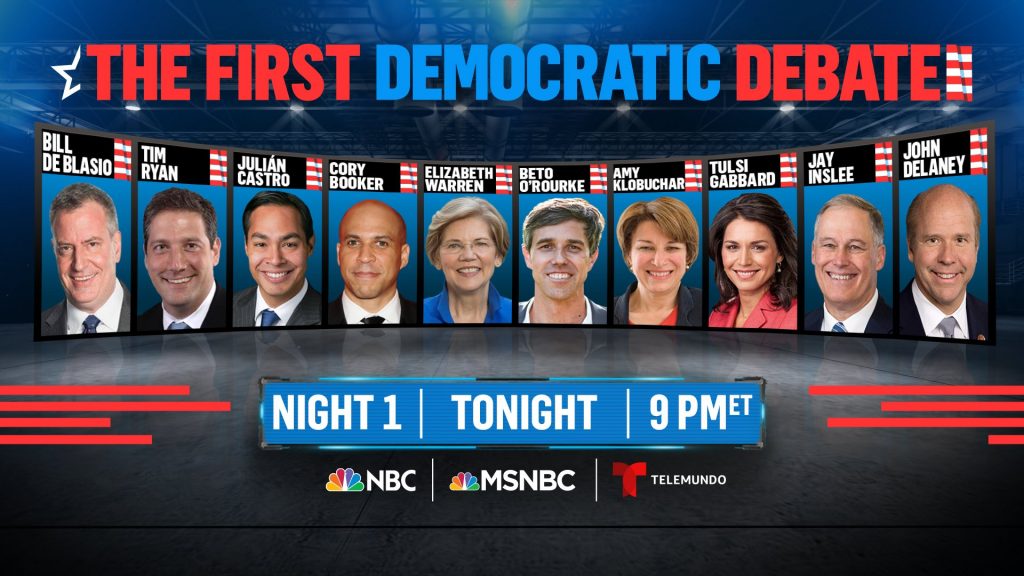
We at Political Beast aren’t known for breaking news, thus the delay in reviewing the performance of the Dem candidates at Night One of NBC’s two-night debate show. Better to take the time to provide our reader the service of fact-checking and historical perspective than to try to be first to the telegraph office. We’d say, “you’re welcome,” but it’s what we enjoy doing.
Let’s look at our first round of candidates and the members of the inquisition, in short:
Senator Cory Booker, New Jersey: The man comes from a low middle-income background, and still lives in a low-income area of Newark, where he got his start as a tenant lawyer. His primary focus since becoming a Senator has been criminal justice reform, and he speaks excellent Spanish.
Julian Castro, Secretary of Housing and Urban Development, Obama Administration, former Mayor of San Antonio: As expected, housing, health care, and pay equity are Castro’s focuses, along with a heavy dose of climate change warnings and solutions. He speaks fluent Spanish.
Bill de Blasio, Mayor of NYC: Focused on continuing and extending Michael Bloomberg’s legacy as a government-for-your-own-good executive, de Blasio has, however, ended “stop-and-frisk” by New York’s police, and has emphasized the importance of relationships to help end gun crime. 76% of New York residents don’t want him back as mayor.
Former Congressman John DeLaney, Maryland: The man left Congress in 2017 to run for president and has spent most of his time in Iowa since then. Boldly claiming the middle of the road as his territory, DeLaney has shaken hands in all 99 counties in Iowa.
Congresswoman Tulsi Gabbard, Hawaii: A veteran of the current war in Iraq, she’s the first candidate to ever be born in an American territory (American Samoa). Getting us out of wars abroad and redirecting the money to green energy tech and universal health care are her calling cards.
Governor Ray Inslee, Washington: Two-term governor has made climate change his numbers 1-3 issues. His record in WA is of ending capital punishment and raising taxes to pay for a massive overhaul of the state economy toward green tech. In agreement or not, one has to recognize the first and only possible example of what the U.S. would look like if we undertook this challenge nationally. Interesting.
Senator Amy Klobuchar, Minnesota: Been in the Senate 14 years, she is one of the few not afraid to be seen crossing the aisle, working with Senator Booker and President Trump to pass “First Act,” an attempt at incarceration reform. Her primary appeal (as in, what she uses to appeal for votes) is her threat to take back the rust belt states from Trump. Klobuchar is quick to pivot to electability as an important factor in who Dems should nominate.
Former Congressman Beto O’Rourke, Texas: It’s not often that losing a Senate race in your home state becomes a qualification for becoming the Democrat Presidential nominee…unless that race is against Ted Cruz, unless you ALMOST won, and unless that state is Texas. Seeing O’Rourke on stage with the rest of the cast makes him look right at home on the left, but his jean-wearing and gun rights toleration made him popular in his home state and makes him intriguing looking forward.
Congressman Tim Ryan, Ohio: Another real rust-belt contender, he’s earned a reputation in Congress as a consensus-builder, was once supported by the NRA, once opposed abortion, and once opposed gay marriage. Regaining the trust of working-class Americans and ending the East Coast-West Coast dominance of the Democrat party are his primary goals. Green tech jobs are how he claims to get this done.
Senator Elizabeth Warren, Massachusetts: A former elementary school teacher, Warren has gained a strong following by arguing basic old-school progressivism still works to fix America’s problems. No controversy or difficulty is beyond Warren’s ability to craft a response and a solution using government resources. She has succeeded in channeling a lot of the left-wing anger into clear plans, mostly focused on health care, gun crime, immigration reform, and the biggest challenge: climate change and green energy.
THE DEBATE, NIGHT ONE, ROUND ONE
Moderators: Lester Holt, anchor of “NBC Nightly News” and “Dateline NBC.”
Savannah Guthrie, co-anchor of “TODAY” and NBC News chief legal analyst.
Jose Díaz-Balart, anchor of “Noticias Telemundo” and “NBC Nightly News Saturday.”
The moderators worked in two shifts. Round one was managed by Lester Holt, Savannah Guthrie, and Jose Diaz-Balart, and was pretty straightforward and traditional.
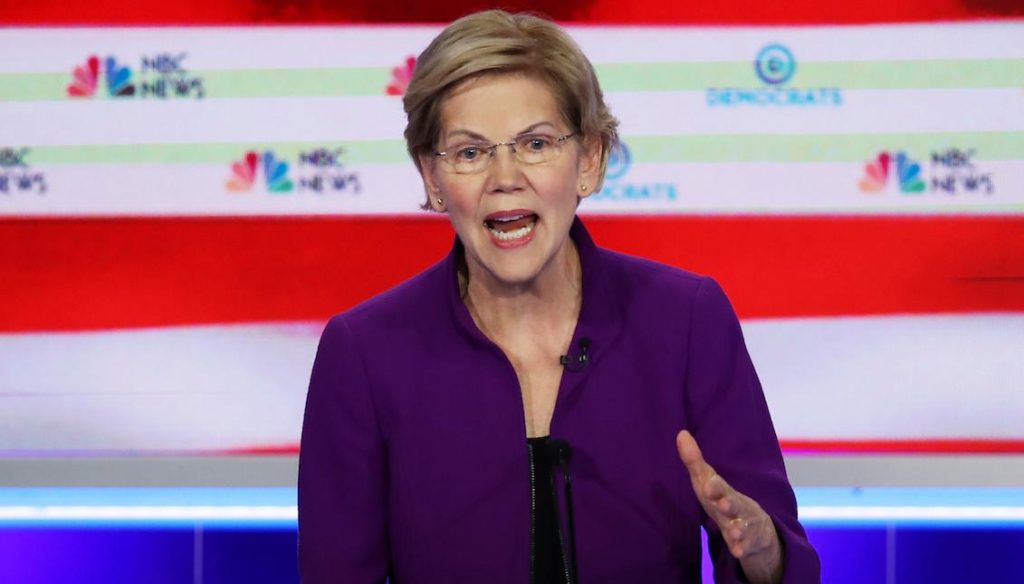 Moderators ask Senator Warren if a hard lurch to the left is a good idea in the current healthy economy. Warren answers the current economy only benefits those at the top, who have the money to buy influence. She says this is the “definition of corruption.” [Economic studies show that, since 2010, the rich have gotten richer, but the poor have gotten SIGNIFICANTLY richer. Unemployment among the lowest earners is lower than it’s been since the data has been kept, although the VERY top 2% are doing inordinately better than everyone else. Interestingly enough, most of these live in Cali or NYC, and most support someone on one of these two Dem debate stages.]
Moderators ask Senator Warren if a hard lurch to the left is a good idea in the current healthy economy. Warren answers the current economy only benefits those at the top, who have the money to buy influence. She says this is the “definition of corruption.” [Economic studies show that, since 2010, the rich have gotten richer, but the poor have gotten SIGNIFICANTLY richer. Unemployment among the lowest earners is lower than it’s been since the data has been kept, although the VERY top 2% are doing inordinately better than everyone else. Interestingly enough, most of these live in Cali or NYC, and most support someone on one of these two Dem debate stages.]
Next, Senator Klobuchar is asked about her comments calling free college a “magic genie.” Is she serious about getting progressive programs implemented? Klobuchar points out that Trump is currently gloating about all the struggling citizens in the country. Only the rich can buy or cheat their way into college. Solid plans are make community college free, double PELL grants, pay for certification programs, and “help pay off student loans.” [We put the last line in quotes because this is exactly how precise Klobuchar was with her plan. Granted, she was wrapping up, but, compared to her other education investment strategies, this fell flat. To her credit, her concrete suggestions are just what we called them there: investments. Hard to fact-check the impact of what history tells us gives the best payoff of all: an educated populace.]
O’Rourke is next. Some (unnamed) candidates want a 70% tax rate on top earners. The moderators ask if this is “right.” The former Congressman starts speaking in broken Spanish and insists (in English) that great wealth buys great access in Trump’s America. We all need a voice, and only “fairness” can give us this. —Moderators ask O’Rourke to answer the question— “Yes, I would support that.” [The current administration has, to an extent, enforced its policy that requires lobbyists to be off the circuit for at least 6 months before working in a White House post. Some exceptions have been made, especially at EPA, and big Pharma has most assuredly succeeded (thus far) in dodging responsibility for the opioid crisis, but this is provably the result of relationships with Congresspeople, both Democrat and Republican, not Trump.]
Senator Booker’s first question takes a turn: Would you support breaking up tech companies? The New Jersey Dem points out that any corporate consolidation is bad for wages and consumer prices —moderators refer to Booker’s criticism of Sen. Warren for “naming names”— Booker says he has no problem naming names, and he would start with those companies who paid no income tax last year. The courts and the DOJ are the best avenues to pursue this. [It’s always interesting to hear candidates arguing that the best way to defend the little guy is to use the Justice Department to beat up the big guy. If this is legal, when does it stop, and what about big guys that are creating millions of jobs? When does this stop? No arguments here, just pointing out some missing follow-ups…]
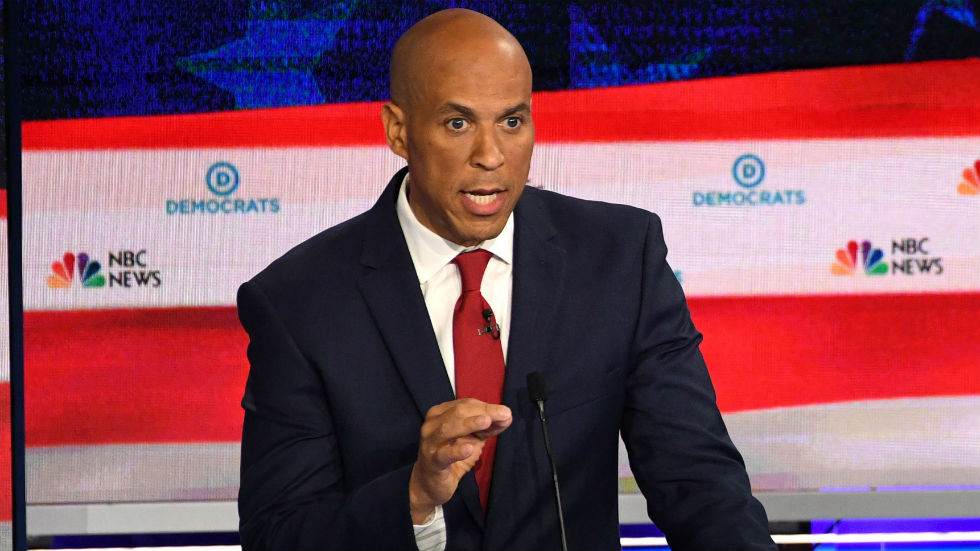 Moderators ask, “Sen. Warren, are you picking winners and losers in corporation America?” Warren says it’s not about picking, it’s about a lack of courage to take on the giants. [Once she gets keyed up, Warren can be a bit scary. We’re not gonna question her level of courage.]
Moderators ask, “Sen. Warren, are you picking winners and losers in corporation America?” Warren says it’s not about picking, it’s about a lack of courage to take on the giants. [Once she gets keyed up, Warren can be a bit scary. We’re not gonna question her level of courage.]
Pivot to Secretary Castro: The moderators point out that the gender pay gap is a major issue for him. What will he do to fix this? Castro describes the struggle his mother went through paying the bills. The secretary (to rousing applause) pushes for immediate ratification of the Equal Rights Amendment for women, along with legislation guaranteeing equal pay for equal work. [The ERA, touted by feminists in the 70s and 80s as the next step in civil rights, was pushed off a cliff by conservative activists like Phyllis Schlafly. The argument against it was simple: unlike slavery, which was once protected by the Constitution, women’s equality was a fact, not a future goal to be one day achieved. Thus, an amendment declaring women equal would, in fact, involve an idea of their current INEQUALITY, and a step backward for women and for civil rights. There is an argument to be made that the pay gap is evidence enough of the unequal role women are playing in society, though.]
Same question next went to Congresswoman Gabbard. She says America deserves a president who will put individual interests above those o the rich and powerful. She fought in Iraq, she’ll fight for you. She’s still a Major in the Army, she sits on several military and security committees. Our current intervention policy costs too much and puts us in danger. The savings should be put toward green jobs and improving the economy. [Not sure the Congresswoman understands exactly how much a retooling of the American economy costs, although military spending is indeed the single largest line-item in the federal budget. If the nation was willing to take her quite seriously and quite at her word, this could conceivably be done by closing 60% of all U.S. bases (home and abroad), and ending 80% of future weapon system development.]
Mayor De Blasio gets an appropriate question to begin his night: “Your city’s pay discrepancies are notable. How do you address income inequality?” De Blasio says he’s doing a lot, then immediately moves to stressing that what’s being heard on this stage is a fight for the very heart of the Democratic Party. Whether this will be a party of the poor, the disenfranchised, the working man and woman, the gay, the straight. —Moderators ask him to answer the question, asking, “Is there enough money there to fix this?”— “Yes, yes. There’s money there.”
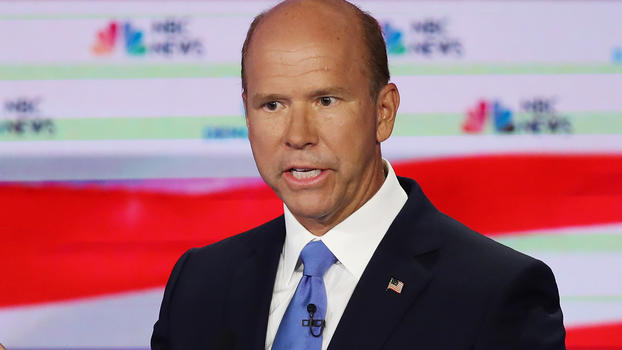 Congressman DeLaney gets the same question. His answers are to double the minimum wage, fix public schools, provide better training programs. “I’m an entrepreneur. I’ve created 1000s of jobs.” Obama gave him, he points out, an award for hiring disabled people. He ends by insisting we increase the Earned Income Credit for families. [Minimum wage increases are a really interesting case study right now, with some states already at the “double” DeLaney pushes. Jumping nationally to this standard would arguably give a shot in the arm to an already healthy economy, but would certainly end the opportunity to test the effects on business. As for the EIC: most individuals and families DO NOT PAY TAXES, thanks to the EIC. In fact, most receive a rebate check in the mail, which they treat as a source of income. The idea of paying low income people in exchange for no additional benefit to the overall economy could be seen as…well…paying low income people in exchange for no additional benefit to the…you get it.]
Congressman DeLaney gets the same question. His answers are to double the minimum wage, fix public schools, provide better training programs. “I’m an entrepreneur. I’ve created 1000s of jobs.” Obama gave him, he points out, an award for hiring disabled people. He ends by insisting we increase the Earned Income Credit for families. [Minimum wage increases are a really interesting case study right now, with some states already at the “double” DeLaney pushes. Jumping nationally to this standard would arguably give a shot in the arm to an already healthy economy, but would certainly end the opportunity to test the effects on business. As for the EIC: most individuals and families DO NOT PAY TAXES, thanks to the EIC. In fact, most receive a rebate check in the mail, which they treat as a source of income. The idea of paying low income people in exchange for no additional benefit to the overall economy could be seen as…well…paying low income people in exchange for no additional benefit to the…you get it.]
Governor Inslee gets the same question. His answer is that unions ARE the answer. Reinvigorating collective bargaining will get the minimum wage raised. The pay difference between the CEO of McDonalds and the burger-flipper of McDonalds is immoral. Green jobs are the future of great-paying jobs. [As mentioned in his bio (above), Inslee is the only candidate who can claim to be currently engaged in an effort to show the country what a retooling toward green tech and green energy jobs looks like.
Congressman Ryan gets an appropriate starter for a guy from Ohio: Are manufacturing jobs coming back, like Trump says? Ryan says that even though big businesses are getting bailouts, they’re still leaving Ohio. People are having to box up equipment and ship it to China, while the bottom 30% of earners haven’t gotten a raise since 1980. [The bottom 100% of waiters and waitresses haven’t gotten a raise since 1985, that’s true. The rest is relative. Interesting that under the current administration, relocations by major corporations has slowed only by 20% or so. Is this significant? Not to Ryan, not apparently.]
Sen. Warren gets the same question: Are manufacturing jobs coming back? Warren says big companies need to be disincentivized to leave, and that green energy tech is the huge opportunity for America’s future manufacturing, creating 1.2 million jobs [The number, 1.2 million, is thrown around a lot by folks supporting the “Green New Deal.” Never do proponents give any estimate of how many jobs will be eliminated or made obsolete by the Green proposals. This column’s responsibility is not to offer conjecture, but only to describe the evidence vacuum of job loss in the current energy and tech sectors once the “New Deal” is in effect.]
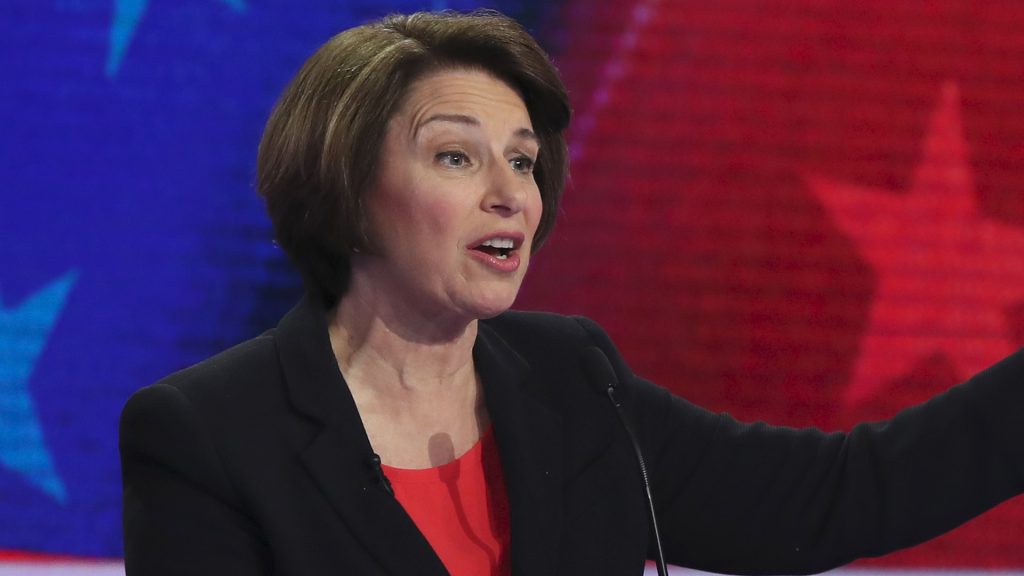 Moderators ask for a show of hands at this point: Who would abolish private health insurance? Senator Warren and Mayor De Blasio raise their hands.
Moderators ask for a show of hands at this point: Who would abolish private health insurance? Senator Warren and Mayor De Blasio raise their hands.
Sen. Klobuchar: Why keep private insurance? Her answer is that Obama liked it, with a public option. She doesn’t wanna kick half of America off in 4 years. She turns to Trump, who said heads would spin over how fast drug costs would get lower once he was elected. Hasn’t happened. In fact, hundreds of drugs have gone up. [Drug costs have gone down almost 25% since Trump was elected, although many of the most common drugs HAVE become more expensive, which is why it’s gotten so much attention lately. This seems to be changing, after a half dozen recent TV exposes have dealt with the issue.]
Sen Warren gets the next question: Bernie Sanders’ Medicare for all. Is that the answer? Yes, she says. One of the number one reasons families go broke is medical, including those who have insurance. The model for insurance is bring in money, pay out little. Patients are left to fight for their health. Health care is a basic human right. She says she’ll fight for it. [The facts on the ground when health care cost is discussed is that 65% of America has private health insurance of some kind. This insurance has gone up 30% in cost since the ACA was passed, and care covered has lessened by 15%. Deductibles are up the same 15%. Whatever we’re doing now isn’t working. Medicare and Medicaid are up for examination as to whether they represent better systems. The fact that everyone MUST be willing to debate on the merits is whether the ACA simply destroyed the rationality of tolerating a private insurance health care system in this country any longer.]
The moderators turn to O’Rourke with a charge: “You’ve been back and forth. Where do you stand on private health insurance?” Everyone having health care is important to the Texan, and he slips in a comment here about women having control of their own bodies.
[Congressman Ryan interjects here that Medicare-for-all would shut down dozens of hospitals. Where this comes from, Political Beast has no idea.]
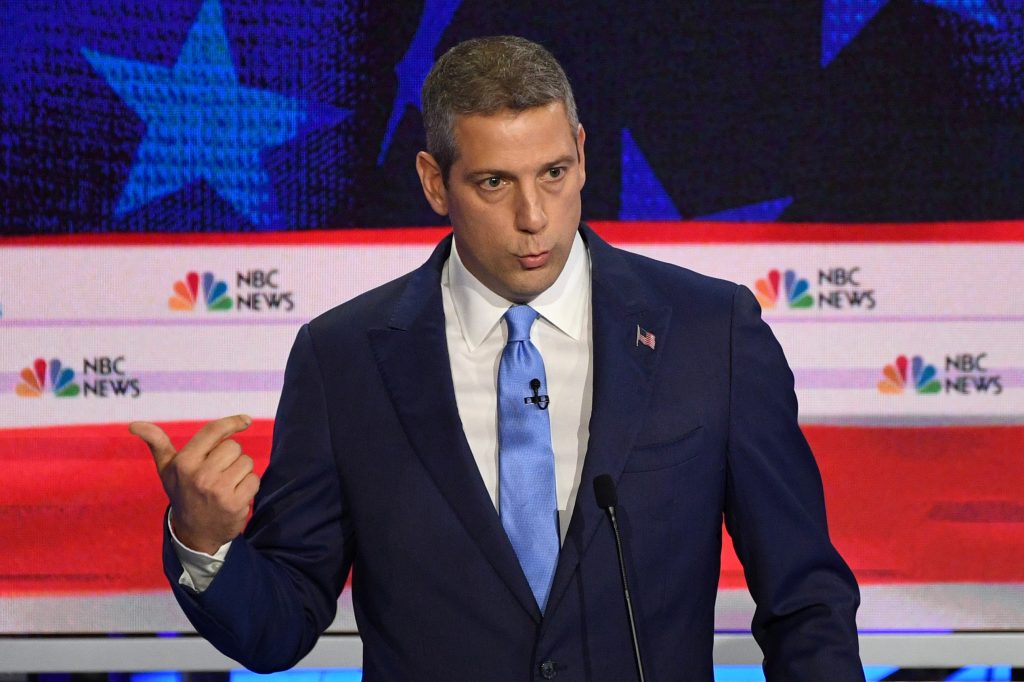
Congressman Gabbard: Weigh in (moderators). She says its about sick people getting better, and that employers would actually like Medicare-for-all, since it would end up costing a lot less for everybody. [This hasn’t been tested in this country, but employers do pay less in most European countries. But companies also pay 4 times the corporate tax that they do in the U.S. It’s all relative.]
Senator Booker? Low income communities mean you aren’t well, so you aren’t doing good in school. This is not just human right, it’s an American right. Overhead for insurance companies is 15%. For Medicare it’s 2%. [His numbers are correct.]
—Sen Warren interjects. $23 Billion last year in profits sucked out of health care by insurance companies, not counting lobbying—
—Gov. Is Lee interjects. “I’m the only one here who passed a law guaranteeing woman’s right to choose.”—
—Klobuchar interjects. “I think there are three women up here who have fought for a woman’s right to choose.”—
Moderator asks Castro: Should the federal government pay for abortions? The secretary answers yes. He believes in reproductive “justice,” not just reproductive “rights.” He would support a trans person’s right to choose and appoint judges and justices who strike down state laws against abortion. [This is an important first for a viable candidate: the argument that society should be paying for gender reassignment surgery.]
Question for Sen. Warren: Any limitations on abortion? No. Pay for access to care, abortion, and birth control. [This part of the debate really started to feel pro forma.]
Question for Booker: 14 of 20 largest Pharma companies are in your state. Do you support criminal liability for opioids? The Senator says yes. We’ve been trying to arrest our way out of addiction. These companies should pay for the treatments necessary to cure the problem. [The handful of communities headed in the counsel-and-treat direction for the drug problem have spent less and had more success than those who follow the “arrest-and-charge” policies that Senator Booker criticizes.]
O’Rourke gets the same question about Pharma and opioids. He says prosecute, and we have to change the way we handle drug crime, especially non-violent.
—Moderators show image of dead immigrants in Rio Grande.—
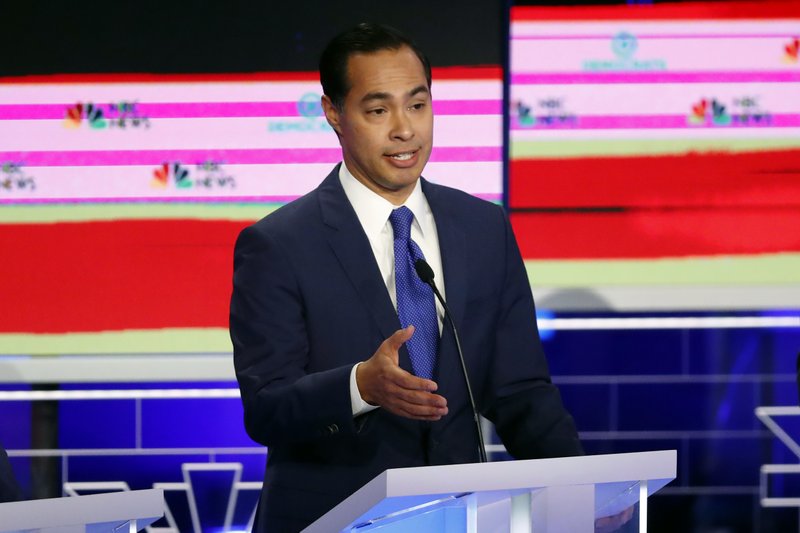 Sec. Castro: What would you do to fix immigration? “If I were president, I would sign an Executive Order ending “remain in Mexico,” and the processing program requiring port of entry. We need a Marshall Plan for Central America.” [Hard to argue against a plan that would raise the quality of life for our suffering neighbors and disincentivize them from fleeing their own countries.]
Sec. Castro: What would you do to fix immigration? “If I were president, I would sign an Executive Order ending “remain in Mexico,” and the processing program requiring port of entry. We need a Marshall Plan for Central America.” [Hard to argue against a plan that would raise the quality of life for our suffering neighbors and disincentivize them from fleeing their own countries.]
Booker: What would you do to fix this? Starts by speaking Spanish. He says he’ll end the ICE policies that deny human rights to immigrants. Re-instate DACA. Make investments in the Northern Triangle. [Similar plan to Castro’s.]
—Castro interjects: Stop treating this immigration as a violation or a crime.—
—Booker interjects: This is happening in America, not just at the border—
—De Blasio interjects: Every American should feel the deaths in the river are terrible, but it’s because of the division that makes Americans think immigrants are a threat. America, the immigrants didn’t do this to you, the corporations and the 1% did this to you. We have to be on the immigrants’ side. If we don’t change the debate, we won’t see change.—
O’Rourke gets asked: What would you do day one on immigration? Starts by speaking Spanish. Not build walls, not put people in cages. Not criminalize people. Free “Dreamers” by making them citizens, invest in Central America.
—Castro interjects: They’re using Section 1325 to criminalize immigration.— [He keeps challenging all the candidates to support the removal of this section. Only Booker will agree. Castro is arguing with O’Rourke over not supporting the repeal. O’Rourke says there’s other legislation he supports to do it. We always hate when candidates get stupidly petty with details like this.]
—Delaney tries to interject: The Hispanic moderator cuts him off. He seems to like the Spanish-speaking candidates better…—
Sen Klobuchar gets asked: What are your answers? She’d be happy to look at any of these proposals. Immigrants are crucial to our country, Noble Laureates and workers in the fields. She’s willing to work with the Republicans to accomplish comprehensive reform. [Klobuchar does have a reputation of working across the aisle. Whether this proves to be a benefit or curse is left in the hands of Dem voters.]
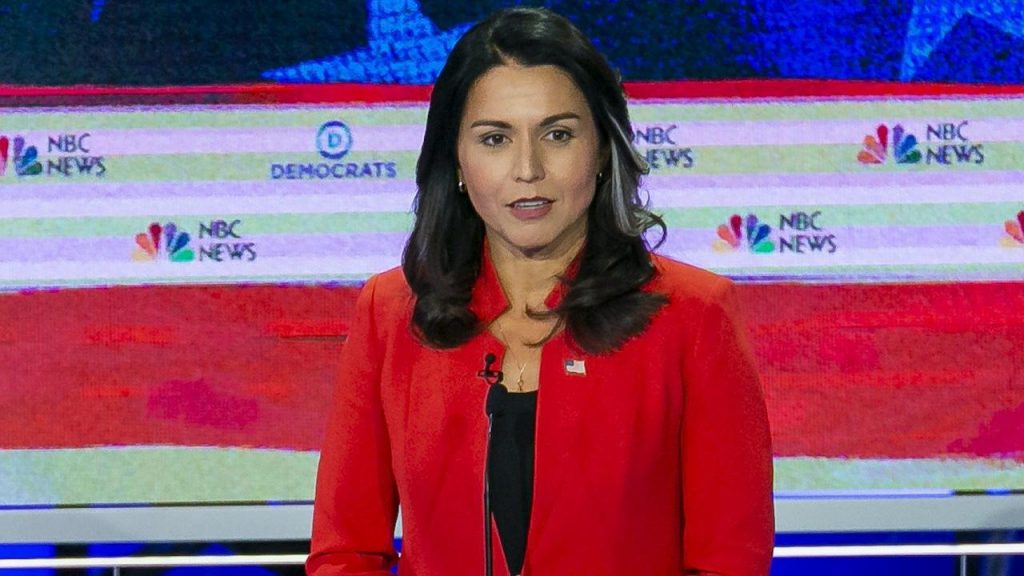 Lester Holt asks Congressman Ryan, “Is illegal immigration a crime?” Ryan insists there are terrorists in Gitmo who get better health care than immigrants. He’d send nurses and doctors to the border, describing Trump’s actions as a sign of weakness.
Lester Holt asks Congressman Ryan, “Is illegal immigration a crime?” Ryan insists there are terrorists in Gitmo who get better health care than immigrants. He’d send nurses and doctors to the border, describing Trump’s actions as a sign of weakness.
Booker: What would you do with these immigrants? “Quit criminalizing immigration, mental illness, addiction. Quit locking people up and support human dignity. Invest in the Northern Triangle. Affirm dignity. Quit giving up our values for border security.” [Booker keeps calling immigration actions an “abandonment of our values.” Interesting to see if this resonates with centrist voters, many of whom see “The Wall” as a necessity, not a value-abandoning exercise.]
Gov. Inslee gets the question: What will you do with these immigrants? He argues for releasing them pending their hearings, following current law. In Washington state, his administration prevents local law enforcement agents from deporting people. Doesn’t support Muslim bans. Trump threatened to send refugees to WA state. Inslee responded by welcoming them.
—Moderators ask another open question: Iran is causing trouble. Who would sign on to the original 2015 Iran Nuclear Deal? Booker doesn’t.—
Booker: It’s Trump’s fault we’re having trouble with Iran. Thinks we could get a better deal even than the original.
Sen Klobuchar: She thinks we get back in the deal. Trump is making us less safe. Let’s negotiate back into the deal, not give unlimited leverage to China and Russia, which is what is happening, and Trump needs Congressional approval for military action. Every 10 minutes this president is almost going to war. [How she figures every “10 minutes” is not clear. Maybe Political Beast is over-thinking…]
Rep. Gabbard: We have to say “No war with Iran.” Get back in the deal and improve it. If there was an attack against our troops, that would be different. John Bolton and Trump are creating a situation where it could all blow up. Put the American people first.
At this point, we change moderators, experience technical difficulties, and, for Political Beast, take a break. See you with the rest of Night One tomorrow…
[Note from the Managing Editor: “Did you even notice these three weren’t included in the main body of the article? No. You didn’t. Know how I know? Because nobody noticed they weren’t in the main body of the debate.”]
